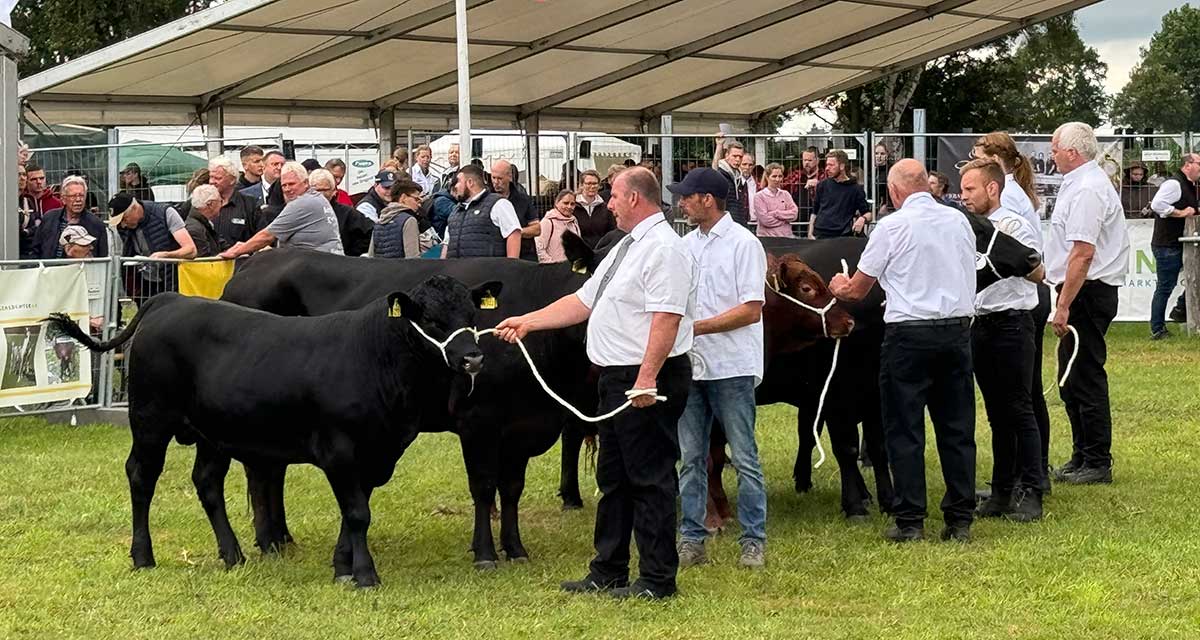European Angus Forum


The Federal Association of German Angus Breeders (BDAH) celebrated its 65th anniversary this year and as a special honour hosted the European Angus Forum from the 10th to the 16th of July 2024. I had the privilege of attending the forum to promote the Neogen World Angus Forum in Australia in 2025. The European Angus Secretariat comprises 16 member countries and they have estimated that there are approximately 90,000 registered Angus females across Europe in countries as diverse as the UK, Romania, Estonia and Portugal. I would like to thank President Richard Brinette for his exceptional welcome and hospitality.
In Germany, up to 40,000 suckler cows belong to the Angus breed. 9,700 Angus herdbook cows are kept in 531 breeding farms in Germany. 16% of all pedigree beef cattle in Germany are Angus. By number, Angus ranks third position of beef cattle breeds. The European Angus Forum concentrated the tour program on the North of Germany with the federal states of Lower Saxony, Mecklenburg-Western Pomerania, Brandenburg and the capital Berlin.
The forum was very welcoming to myself and Jack Laurie from Breeder Genetics who also attended the forum. This forum was a landmark event where the 16 member countries reached a historic agreement to work together to produce a regional genetic evaluation across all countries. Ultimately, the goal is to work together and to position Europe in a technical position to be able to join the World Angus Evaluation.
I was invited to speak on our experience in terms of our TACE regional genetic evaluation and the Angus Australia experience in being a foundation participant in the World Angus Evaluation. I was also given ample opportunity to promote the 2025 Neogen World Angus Forum.. From the discussions that followed there is certainly a strong opportunity to collaborate with Europe and we can certainly expect a large number of visitors from a range of European countries to 2025 the Neogen World Angus Forum.
Angus Australia members may be quite surprised to learn that European breeders watch with interest from afar the activities of Angus Australia and have a real interest in Australian Angus genetics. Often the conversation would circle to “how can Europeans access Australian Angus genetics”. Certainly, some Australian bulls have had great success, particularly in the Ireland beef on dairy industry.
If you are attending the Zoetis AngusEXPO in Tamworth in 2025 please be aware that you may have strong enquiry from European breeders. In other publications and certainly in our Export Readiness Workshops we have made our members aware of how animals can qualify for the European Angus market as there are more stringent requirements.
The European Angus industry is certainly more mixed in terms of both Red and Black coated Angus animals. The ratio would be around 50/50 red to black. European beef production is geared towards yield, muscle and growth. As a consequence, Angus producers in Germany have often developed paddock to plate businesses to market quality Angus meat that isn’t necessarily rewarded in traditional supply chains. Other producers have developed contracts with meat processors that have direct to restaurant sales channels. Angus beef and it inherit marbling qualities are sold to a niche section of the beef producing public. The meat industry is dominated by pork production and sausage.
Typically, the herds that we visited were smaller than Australian producers and had significant investment in shed systems to house animals in winter periods. The larger herds that we did visit were typically located in former East Germany and were often corporate style agriculture with similar production systems to Australia.
This article doesn’t allow the scope to describe or mention every breeder in Germany, but I’ll describe one operation which may give readers a sense of the type of breeder. Meyn Angus was located near Steesow in the former East Germany area. They farm 2,700 hectares comprising of both arable crop and pasture. They breed 770 suckler cows in a rainfall band of approximately 500mm per year. They produce registered bulls but also have a significant direct supply chain to supply a regional meat company and a modern, indoor feedlot to finish bulls and heifers. This was a very professionally operated facility with an extremely strong market focus. The quality of cattle was excellent.
I would encourage all of our members to warmly welcome the European guests to the 2025 Neogen World Angus Forum.. You will find deep interest and potentially opportunities to export semen and embryos.
Scott Wright – CEO